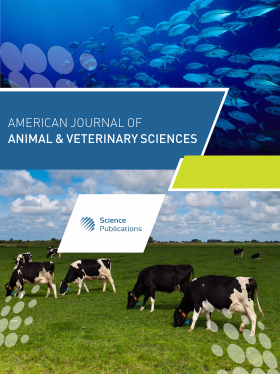Evaluation of Polymorphisms at Heat Shock Protein 90 Gene by High Resolution Melting Assays for Potential Heat Tolerance among Nigerian Zebu Cattle Breeds
- 1 Federal University Dutse, Nigeria
- 2 Sokoine University of Agriculture, Tanzania
- 3 Tamil Nadu Veterinary and Animal Sciences University, India
- 4 Federal University of Agriculture, Nigeria
- 5 University of Ilorin, Nigeria
- 6 Federal College of Agriculture, Nigeria
- 7 University of KwaZulu-Natal, South Africa
- 8 Nasarawa State University, Nigeria
Abstract
Heat Shock Protein (HSP) 90 gene is a member of HSPs sub-family that act as molecular chaperons whenever animals come under thermal stress. The genes fulfill essential roles of providing cellular protection, immune response, protein synthesis, protein folding and unfolding, protection from cellular stress, inhibitory apoptosis and adaptation. This study was designed to analyze polymorphisms of HSP 90 and to evaluate their influence on heat tolerance among selected Nigerian zebu. The polymorphisms were also used to determine genetic relationship among the animals. About 450 bp of bovine HSP 90 including part of coding region in exon 3 was sequenced in 90 DNA samples representing four Nigerian zebu namely White Fulani (WF), Sokoto Gudali (SG), Red Bororo (RB) and Ambala (AM). Sequencing was done using an automated ABI-DNA Sequencer. Editing was accomplished using chromatogram analyses on SeqMan Ngen Tool. Rooted phylogenetic tree was constructed using MEGA 5.2 software. In total, 11 genetic variants were determined. Five of these (PRP, RED, ORG, LMN and YLO) were major variants detected in over 70% of the samples. Six (6) were classified as minor variants detected in two breeds or less and in 29.1% of the samples. The GRN and NBL were only detected in RB and SG breeds respectively. We found a shared homology and common ancestral lineage among the breeds. Furthermore, the genetic structure of Nigerian zebu has a common clade architecture to those of goats, sheep, yak, buffalo, camel, horse and other taurines. The gene is conserved among wide range of animals and as such it can serve as one of bio-markers for selection and breeding programmes for thermo-tolerance in wide range of livestock animals under thermal stress. The variant groups could be further interrogated for possible specific effects on thermo-tolerance performance of zebu in hot tropical environments.
DOI: https://doi.org/10.3844/ajavsp.2020.32.42

- 5,763 Views
- 4,079 Downloads
- 10 Citations
Download
Keywords
- Bio-marker
- Bos indicus
- Genetic Variants
- Phylogeny
- Thermal Assault
